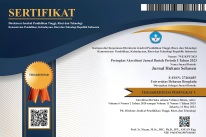Analysis of Legal Protection of Sexual Violence Against Domestic Workers
Abstract
The existence of Women Workers or Domestic Workers is familiar in Indonesia both in urban and rural areas. The government's lack of attention to domestic workers, the majority of whom are women, has made many of them victims of violent crimes. This study aims to determine the legal protection of domestic workers who get sexual violence and find out the criminal sanctions obtained by perpetrators of sexual violence. This type of research is qualitative research using a normative approach, which includes a statutory approach (statute approach) and a conceptual approach (conceptual approach). The sources of legal materials used are primary legal materials, secondary legal materials, and tertiary materials. The legal material that has been collected is then reviewed systematically and classified to produce a conclusion. The results showed that explicitly domestic workers who are victims of domestic violence receive protection from several laws and regulations but do not specifically regulate the form of protection, both related to employment relations, discrimination, violence, wages, and so on. Unlike Law No. 23 of 2004 on the Elimination of Domestic Violence and the Criminal Code, both preventive and repressive means protection for domestic workers as part of their family. Criminal sanctions in Law Number 23 of 2004 concerning the Elimination of Domestic Violence are formulated alternatively, namely imprisonment or fines. This means that perpetrators of domestic sexual violence can be subject to imprisonment or fines.
Downloads
Copyright (c) 2023 Gabriella Sandra S., Noenik Soekorini

This work is licensed under a Creative Commons Attribution-ShareAlike 4.0 International License.






